New Notebook
Being Enterprising

Introduction
- Entreprising Person: Defined as someone who shows initiative; takes on new tasks or projects. This character trait is crucial for starting new businesses, referred to as entrepreneurship.
- Focus of the Chapter: Understanding the characteristics, skills, and attributes of enterprising individuals and entrepreneurs.
Activate Your Knowledge
- Activity Suggestion: Collaborate with a classmate to share experiences of being enterprising. Reflect on tasks you undertook, skills needed, and outcomes. This reinforces practical learning and collaboration.
Being Enterprising
- Application of Skills: Individuals can apply their skills in various life aspects, contributing to their community and personal growth.
Examples of Enterprise in Different Areas:
| Area | Examples of Enterprises |
|---|---|
| Home | - Operating an Airbnb<br>- Growing vegetables<br>- DIY repairs<br>- Creating storage space<br>- Babysitting for neighbors |
| School | - Organizing fundraising events<br>- Starting clubs for charity<br>- Environmental initiatives |
| Local Community | - Active participation in charities<br>- Fundraising for local needs<br>- Setting up community watch schemes |
| Personal Life | - Attending classes to develop skills<br>- Joining a gym for health improvement<br>- Volunteering for community service |
| Government | - Smoking ban to improve public health<br>- National Lottery for funding causes<br>- Initiatives by IFSC for employment opportunities |
Additional Thoughts:
- Home Enterprises: Highlight the importance of innovation in daily life. Simple activities like offering accommodation or growing food can enhance financial stability while benefiting the community.
- School Initiatives: Encourages students to take responsibility and engage in social causes, developing leadership and organizational skills.
- Local Community Engagement: Involvement in local issues fosters a sense of belonging and impact, promoting community cohesion.
- Personal Life Development: Emphasizes continuous learning and skill development—essential for adaptability in changing work environments.
- Government Role: Illustrates how governmental initiatives can enhance quality of life and public health, reflecting a collective approach to societal improvement.
Extended readings:
Notes on Financial Enterprises and Support in Ireland

Role in Society
-
Provision of Goods and Services: Financial enterprises offer a diverse range of products and services that benefit consumers and businesses alike.
- Thoughts: This means that financial enterprises are vital for everyday transactions and the functioning of the economy.
-
Employment: They are significant employers within the country.
- Additional Info: The employment provided helps boost local economies and reduce unemployment rates.
-
Tax Contributions: Financial enterprises contribute substantial amounts to the government in taxes, which are utilized for public services.
- Thoughts: These taxes help fund essential services like education, healthcare, and infrastructure.
-
Support for Entrepreneurs: They provide financial resources and guidance for entrepreneurs looking to start new businesses.
- Additional Info: This assistance is crucial for fostering innovation and economic growth in various sectors.
-
Community Sponsorship: Financial enterprises help finance local sports clubs and events through sponsorship.
- Thoughts: This involvement strengthens community ties and promotes a sense of belonging among residents.
Support for Financial Enterprises
- Sources of Support: Various sources are available for individuals planning to establish a 'for-profit' enterprise.
- Thoughts: Understanding these resources is essential for aspiring entrepreneurs to navigate financial support avenues.
Local Enterprise Office
- Objective: There are 31 Local Enterprise Offices in Ireland, serving existing and new small enterprises with up to 10 employees.
- Note: The objectives include:
- Developing local businesses to create jobs
- Helping businesses engage in export trade
- Providing training for new entrepreneurs
- Offering financial support to startups
- Assisting in navigating government resources
- Note: The objectives include:
Enterprise Ireland
- Support for Start-ups: Offers support to startups believed to have potential to make international sales and create jobs.
- Key Services:
- Business planning assistance
- Access to development programs
- Investor readiness support
- Mentorship and grants
- Thoughts: This structured support increases the chances of startup success significantly.
- Key Services:
Microfinance Ireland
- Loan Provision: Offers small loans between €2,000 and €25,000 for start-ups and established businesses.
- Qualifying Criteria: Businesses must have under ten employees and an annual turnover of less than €2 million.
- Additional Info: This financial aid also provides mentoring support, helping businesses to grow sustainably.
Test Yourself
- Explain the term financial enterprise. Give two examples.
- Outline five important roles a financial enterprise plays in society.
- Write a short note on how each of the following supports financial enterprises in Ireland:
- Local Enterprise Office
- Enterprise Ireland
- Microfinance Ireland
Example Business: Goldfish
- Business Model: Goldfish, a telecoms provider for various businesses, illustrates the type of enterprise that can benefit from Local Enterprise Office support.
- Breakthrough Moment: Highlighting the significance of identifying key business opportunities and making strategic partnerships.
- Support Example: Local Enterprise Office’s assistance with recruitment and PR was pivotal for Goldfish’s stability and growth.
Summary
Understanding the role of financial enterprises and the support available can significantly benefit aspiring entrepreneurs. This knowledge is essential for navigating the economic landscape in Ireland and leveraging opportunities for growth and stability.
Extended readings:
Social Enterprise
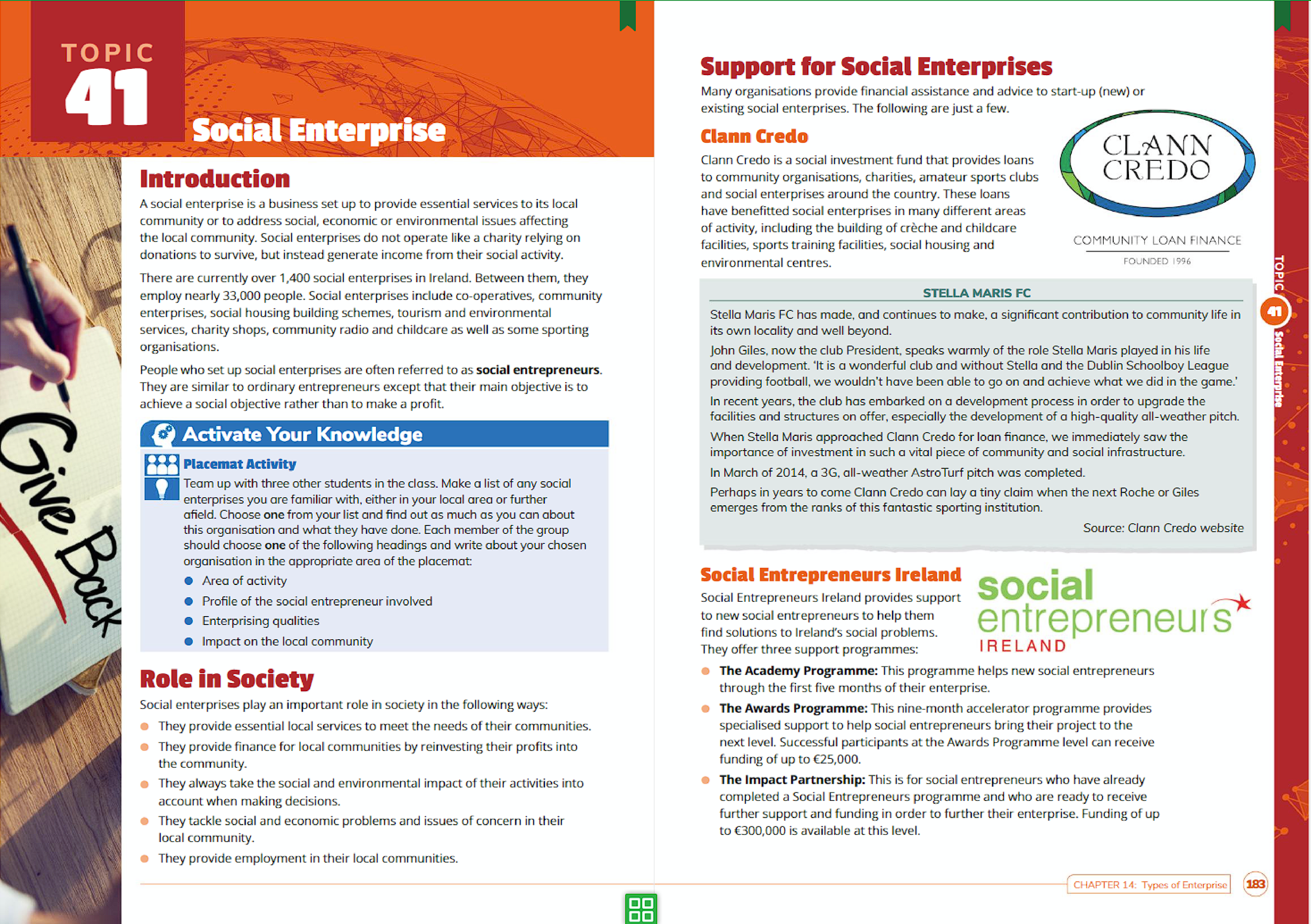
Introduction
-
Definition: A social enterprise is a business that provides essential services to the local community, addressing social, economic, or environmental issues.
- Thoughts: This dual focus on social good and economic viability distinguishes social enterprises from traditional businesses and charities.
-
Prevalence in Ireland: There are over 1,400 social enterprises in Ireland, providing various services and support.
- Additional Info: These enterprises range from cooperatives to community shops, each addressing unique needs within the community.
-
Social Entrepreneurs: Individuals who establish social enterprises are referred to as social entrepreneurs. Their main goal is to achieve social impact rather than solely making profit.
Role in Society
-
Meeting Local Needs: Social enterprises fulfill essential local services.
- Thoughts: By focusing on community-specific needs, social enterprises can create tailored solutions that may be overlooked by larger organizations.
-
Reinvesting Profits: They reinvest profits back into the community.
- Additional Info: This model promotes sustainability and helps fund further initiatives within the local area.
-
Environmental Responsibility: Activities take social and environmental impacts into account.
- Thoughts: This consideration is crucial as environmental issues increasingly affect community wellbeing.
-
Addressing Issues: They tackle social issues and concerns within the community.
- Additional Info: This can include issues like unemployment, education access, and community health.
-
Local Employment: Social enterprises provide jobs within the local community.
- Thoughts: By creating employment opportunities, social enterprises help strengthen local economies and foster community cohesion.
Support for Social Enterprises
Several organizations offer financial support and resources for social enterprises:
| Organization | Description |
|---|---|
| Clann Credo | Provides financial assistance to community organizations, charities, and social enterprises, benefiting various sectors including training facilities and community centers. |
| Social Entrepreneurs Ireland | Offers support through programs for new social entrepreneurs to find solutions to social problems, including: |
| The Academy Programme | Helps new social entrepreneurs in the initial months of their journey. |
| The Awards Programme | Provides specialized support for developing projects, with funding opportunities up to €25,000. |
| The Impact Partnership | Facilitates funding for social entrepreneurs who have completed specific training programs, available up to €300,000. |
Example: Stella Maris FC
-
Contribution: Stella Maris FC has made significant contributions to local community life.
- Thoughts: Their involvement illustrates how local sports clubs can serve as vital social enterprises, enhancing community engagement.
-
Projects: Recent developments in infrastructure showcase their commitment to community service.
- Additional Info: Collaborating with organizations like Clann Credo highlights the importance of partnerships in achieving social objectives.
Extended readings:
Cultural Enterprise and Social Enterprise Initiatives

FoodCloud
- Overview: FoodCloud is a charity aimed at reducing food waste and addressing food poverty.
- Key Insight: Approximately 1 million tonnes of food are wasted annually while one in ten people live in poverty. This highlights the urgency and impact of addressing food waste as a social issue.
- Solution: An app and platform that allows businesses with surplus food to connect with local charities in need.
- Awards and Support: Won the Impact Award, which provided funding, mentorship, and exposure, allowing expansion both locally and internationally.
Kickstart 2018
- About: A program designed to support social enterprises and create job opportunities for people with criminal convictions.
- Funding: Grants up to €30,000 for organizations employing ex-offenders and individuals recently released from prison.
- Development: Jointly developed with the Probation Service, emphasizing the importance of reintegration into society and the social benefits that can arise.
Test Yourself
-
Social Enterprise Definition:
- Explanation: A social enterprise is an organization that operates to promote social goals while being financially self-sustaining.
- Examples: FoodCloud, other local charities.
-
Social Enterprise Roles:
- Five important roles include:
- Addressing community needs.
- Providing employment opportunities.
- Supporting sustainable practices.
- Delivering social innovation.
- Engaging with local stakeholders.
- Five important roles include:
-
Supporting Social Enterprise:
- Clann Credo: A social finance organization providing loans to social enterprises.
- Social Entrepreneurs Ireland: A network supporting social entrepreneurs through funding and mentorship.
- Kickstart 2018: Program aiding social enterprises for those with criminal backgrounds.
-
Research Activity:
- Teamwork is encouraged to research and list cultural enterprises in the local area, promoting awareness and engagement within the community.
Cultural Enterprises
- Overview: Organizations that promote culture, heritage, and the arts while also aiming for profitability.
- Tourism Promotion: Initiatives like Fáilte Ireland and visitor centers are crucial for promoting the culture and generating economic activity.
- Support for the Arts: Organizations like the Arts Council of Ireland and local sports clubs foster community engagement and preserve cultural heritage.
Riverdance
- Description: A renowned Irish dance performance that began in 1994.
- Significance: Features traditional Irish music, showcasing cultural art forms to global audiences.
- Impact: Over 25 million viewers worldwide; has revived interest in traditional Irish dance and music.
By understanding these concepts, we can appreciate the intertwined roles of social and cultural enterprises in addressing social needs and preserving cultural heritage while also pursuing profitability.
Extended readings:
Notes on Forms of Business Ownership

Role in Society
- Cultural Enterprises Impact:
- Cultural enterprises play a pivotal role in the economy and community well-being.
- They create opportunities for employment and promote local heritage.
- Thoughts: Supporting cultural enterprises can foster tourism, which in turn boosts local economies. Community events encourage social cohesion.
Support for Cultural Enterprises
- Sources of Support:
- Assistance is accessible from various organizations to help cultural enterprises thrive.
The Arts Council of Ireland
- Role:
- It is the Irish government body focused on developing the arts in Ireland, providing support to artists and organizations.
- Thoughts: The council's initiatives can significantly enhance the visibility and sustainability of cultural projects.
Conradh na Gaeilge
- Function:
- A social and cultural organization promoting the Irish language and culture.
- Involved in campaigns to elevate Irish culture to an official language status within the EU.
- Additional Info: Supports community engagement with the Irish language, enhancing cultural identity.
Test Yourself
- Social Enterprise Definition:
- A social enterprise utilizes a business model to address social issues.
- Examples: Community cooperatives or non-profit shops that reinvest profits into local projects.
- Roles of Cultural Enterprises:
- They enhance cultural access and education.
- They provide entertainment and promote local heritage.
- Cultural Enterprise Sources:
- The Arts Council of Ireland
- Conradh na Gaeilge
Forms of Business Organization
- Types of Business Organizations:
Type Sole trader Partnership Private limited company Franchise Co-operative Not-for-profit organization
Sole Trader
- Definition:
- A sole trader operates individually, managing their own business.
- Common examples include local vendors or freelancers.
- Starting as a Sole Trader:
- Identify the business area (e.g., opening a new café or a landscaping service).
- Choose a strategic location that ensures high visibility and foot traffic.
- Thoughts: Selecting the right location and service type is critical for success, as it can attract a steady customer base.
Activation Activity
- Reflection on Business Organization:
- Task: Evaluate different business organization statements to determine their validity based on your understanding.
- Purpose: Helps in assessing knowledge and understanding of business structures.
Keywords
- Sole Trader: A person who owns and runs his or her own business.
Extended readings:
Notes on Business Structures

Sole Trader
-
Formation and Flexibility:
- It is very easy to become a sole trader, offering a simple entry into business.
- The individual has full control over decisions, allowing prompt responses to market changes.
-
Advantages:
- Low initial costs and ease of setup mean fewer barriers for new entrepreneurs.
- All profits belong to the sole trader, incentivizing hard work and personal investment in the business.
- Direct relationship with customers can enhance service and loyalty.
-
Disadvantages:
- Unlimited liability places personal assets at risk if the business incurs debts.
- Difficulty in competing with larger businesses due to financial resource constraints.
- The sole trader bears complete responsibility for decision-making and business operations, which can be burdensome.
Unlimited Liability
- Definition:
- A sole trader is responsible for all business debts personally. This means that if the business fails, personal assets can be used to settle debts, emphasizing the risk in sole trading.
Partnership
-
Definition:
- Partnerships involve two to twenty individuals working together for mutual profit. They often require formal agreements and shared responsibility for debts.
-
How to Set Up a Partnership:
- Register the partnership name with the Companies Registration Office (CRO).
- Draft a formal agreement outlining roles and responsibilities.
-
Advantages:
- Partners can pool resources, expertise, and financial contributions, allowing for potential growth and shared risks.
- Easier decision-making through collaboration, leveraging diverse skills.
-
Disadvantages:
- Unlimited liability for partnerships means all partners share responsibility, which can complicate financial liability and decision-making.
- Potential for disagreements that could disrupt operations.
Private Limited Company
-
Definition:
- A structure where a business is owned by shareholders. Shareholders are only liable for the company’s debts to the extent of their investment, providing a level of personal asset protection.
-
Shareholders:
- Investors contribute capital and gain a share of the business proportional to their investment. This structure encourages investment but requires careful management of relationships and expectations among shareholders.
Limited Liability
- Definition:
- Limited liability protects personal assets if the business incurs debt or goes bankrupt, making it an attractive option for many entrepreneurs.
| Business Structure | Liability Type | Notes |
|---|---|---|
| Sole Trader | Unlimited Liability | Personal assets at risk. |
| Partnership | Unlimited Liability | All partners share financial responsibility. |
| Private Limited Company | Limited Liability | Personal assets protected; liability limited to investment. |
This summary emphasizes the various business structures and their implications for liability and operational management. Understanding these distinctions is crucial for anyone looking to start or invest in a business.
Extended readings:
Notes on Setting Up Different Business Structures
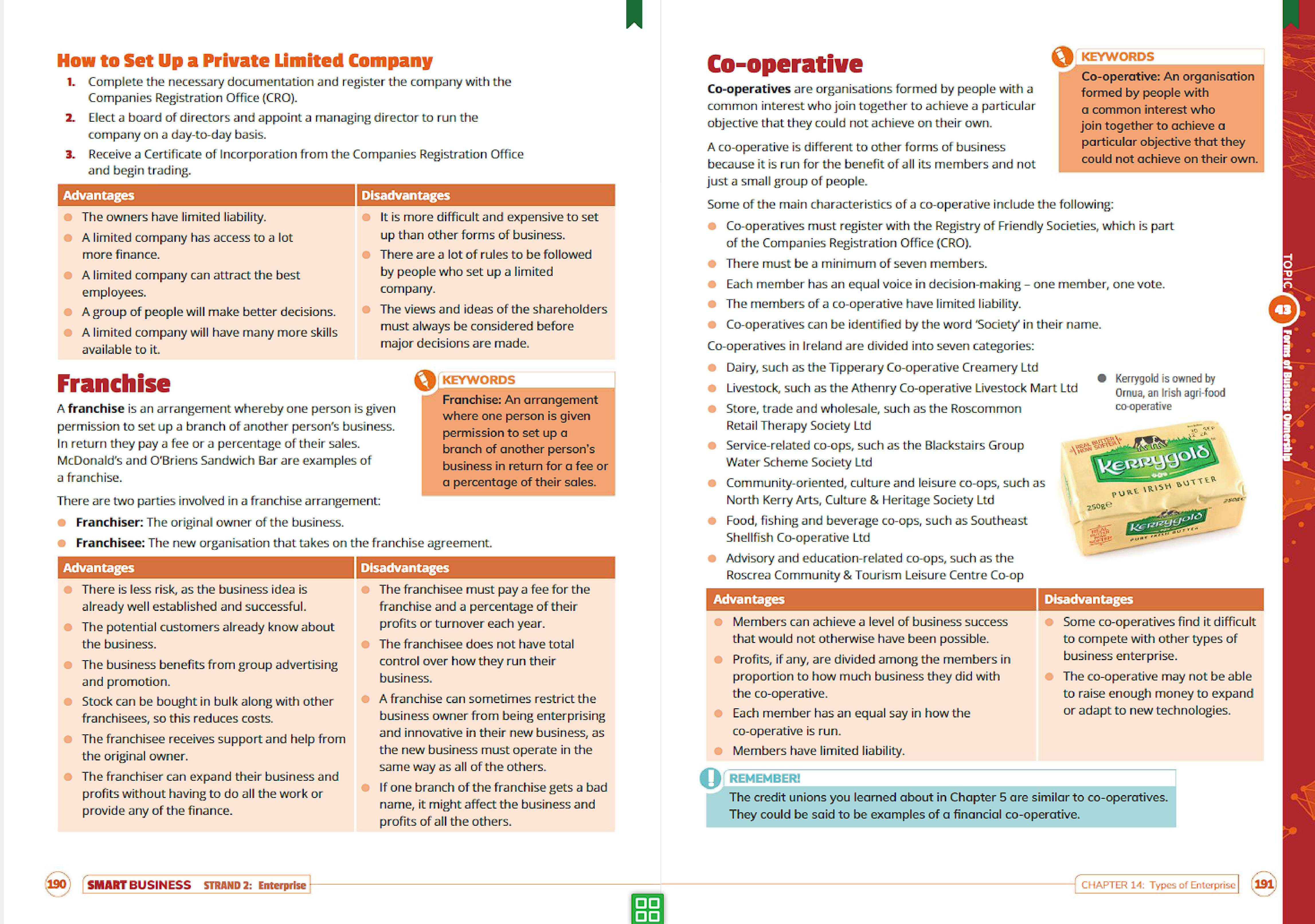
How to Set Up a Private Limited Company
-
Documentation:
- Complete necessary documentation and register with the Companies Registration Office (CRO).
- This ensures legal recognition and allows for limited liability protection.
-
Management Structure:
- Elect a board of directors to manage the company on a day-to-day basis.
- A well-structured management can enhance decision-making and strategy implementation.
-
Incorporation:
- Receive a Certificate of Incorporation to begin trading.
- This certificate signifies that the company is legally recognized.
Advantages
- Limited Liability: Owners have restricted liability, which protects personal assets.
- Access to Capital: Limited companies can attract investors more easily.
- Better Decisions: A diverse board can lead to more informed and balanced decision-making.
Disadvantages
- Complex Setup: It can be costly and complicated to establish compared to other business types.
- Regulatory Restrictions: Numerous rules exist that must be adhered to when managing a limited company.
- Shareholder Influence: Decisions may be influenced significantly by shareholders, which could lead to conflicts.
Franchise
Definition
- A franchise is where one person receives permission to operate a business under another's brand, often paying fees or a percentage of sales.
Types of Franchise Owners
| Owner Type | Description |
|---|---|
| Franchiser | The original owner of the business. |
| Franchisee | The new organization that runs the franchise. |
Advantages
- Lower Risk: The business model is already established, reducing risk compared to starting new.
- Brand Recognition: Potential customers are likely familiar with the brand, aiding in initial sales.
- Support: Franchisees receive ongoing support and marketing from the franchiser.
Disadvantages
- Fees: Franchisees must pay a fee plus a percentage of their profits or sales.
- Limited Control: Franchisees may not have full autonomy over business operations.
- Standardization Issues: Sometimes franchise rules restrict creativity and innovation.
Co-operative
Definition
- Co-operatives are formed by individuals with a collective interest, allowing them to achieve goals that would be difficult alone.
Characteristics of a Co-operative
- Registration: Must register with the Registry of Friendly Societies.
- Member Participation: Typically have an odd number of members with equal voting rights.
- Identity: Co-operatives often include 'Society' in their name.
Examples of Co-operatives in Ireland
| Sector | Example |
|---|---|
| Dairy | Tipperary Co-operative Creamery Ltd |
| Livestock | Athenry Co-operative Livestock Mart Ltd |
| Retail | Roscommon Retail Therapy Society Ltd |
| Community-oriented | North Kerry Arts, Culture & Heritage Society |
Advantages
- Business Success: Members can achieve success collectively, potentially expanding market reach.
- Profit Sharing: Profits are divided among members, promoting equitable distribution.
- Limited Liability: Like limited companies, members are generally protected against financial losses.
Disadvantages
- Competition Issues: Some find it challenging to compete with larger enterprises.
- Raising Capital: May struggle to obtain financing compared to other business types.
- Innovative Restrictions: Rules may limit adaptability to changing market conditions.
Extended readings:
Not-for-Profit Organisation and Entrepreneurs
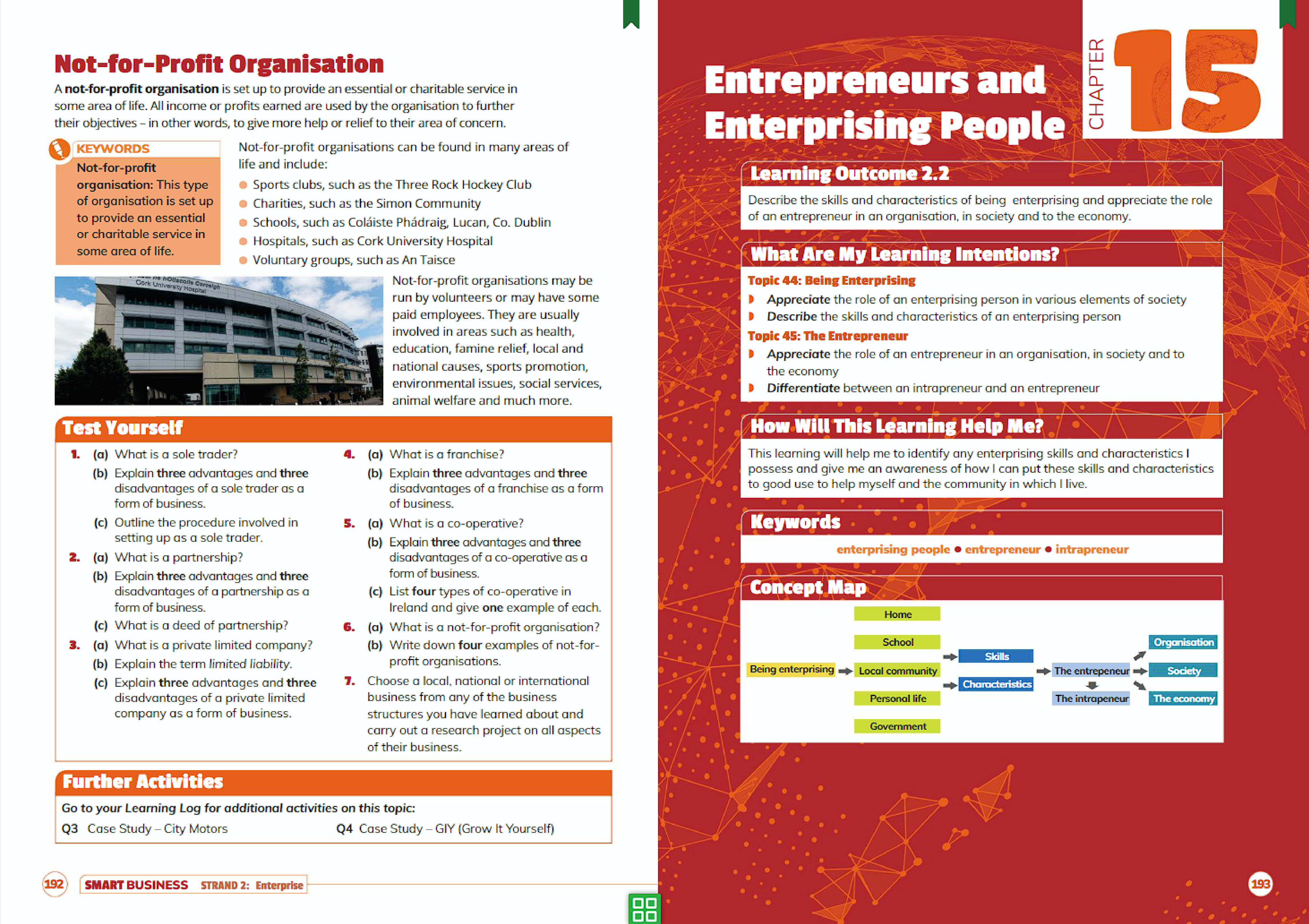
Not-for-Profit Organisation
- Definition: A not-for-profit organisation is established to provide essential or charitable services without the intention of generating profit.
- Purpose: Focuses on furthering specific objectives, giving help or relief to areas of concern.
- Examples of Not-for-Profit Organisations:
- Sports clubs (e.g., Three Rock Hockey Club)
- Charities (e.g., The Simon Community)
- Schools (e.g., Coláiste Phádraig, Lucan)
- Hospitals (e.g., Cork University Hospital)
- Voluntary groups (e.g., An Taisce)
Test Yourself Section
Questions and Insights:
-
What is a sole trader?
- A sole trader operates their business independently, fully responsible for its success or failure.
- Advantages: Full control over decisions, simple tax affairs, and easier to set up.
- Disadvantages: Unlimited liability, potential for high stress, and challenges in raising funds.
-
What is a partnership?
- A partnership involves two or more individuals working together in a business.
- Advantages: Shared responsibility, diverse skills and expertise, and easier to raise funds.
- Disadvantages: Unlimited liability for all partners, potential for disputes, and profit sharing.
-
What is a private limited company?
- A limited company is a separate legal entity from its owners, offering limited liability.
- Advantages: Limited liability protection, ease of raising capital, and perpetual succession.
- Disadvantages: More regulations and costs, and possible double taxation on profits.
-
What is a franchise?
- A franchise allows an individual (franchisee) to operate a business under the branding of a larger company (franchisor).
- Advantages: Established brand recognition, support from the franchisor, and lower risk of failure.
- Disadvantages: Ongoing fees to the franchisor, less control over operations, and contractual obligations.
-
What is a co-operative?
- A co-operative is a business owned and operated by a group of individuals for their mutual benefit.
- Advantages: Democratic control, shared profits, and community focus.
- Disadvantages: Slower decision-making processes, potential conflicts among members, and regulatory requirements.
-
What is a not-for-profit organisation?
- Similar to the definition above, they aim to further social, cultural, or environmental causes rather than making profit.
- Examples: Charities, educational institutions, and community organizations.
-
Research Activity: Choose a local, national, or international business to analyze different business structures and their operations.
Key Concepts
- Keywords: Not-for-profit organisation, franchise, partnership, co-operative, sole trader.
- Learning Outcome: Understanding the skills and characteristics of entrepreneurs and the importance of various business structures in society and the economy.
Concept Map
- Being Enterprising:
- Home
- School
- Local community
- Personal life
- Government
- Keywords:
- Skills
- Characteristics
- The entrepreneur
- The intrapreneur
- Organisation
- Society
- The economy
This outline expands upon the main ideas presented in the image while integrating additional context and implications for a comprehensive understanding of not-for-profit organisations and entrepreneurship.
Extended readings:
The Labour Force

Volunteerism
- Definition: The act of voluntarily offering services or assistance to others without monetary compensation.
- Thoughts: Volunteerism fosters community spirit and provides valuable life skills to volunteers.
- Additional Information: It can include activities like helping in local schools, charity work, or participating in community events.
Benefits of Volunteerism
-
To the Volunteer:
- Gains experience and skills.
- Enhances personal satisfaction.
- Expands social networks.
-
To the Organization:
- Increases capacity for service delivery.
- Brings diverse skills and perspectives.
- Reduces operational costs.
-
To Society:
- Strengthens community ties.
- Addresses social issues and needs.
- Promotes civic engagement.
Reasons People Volunteer
- Personal growth and development.
- To give back to the community.
- To meet new people and make friends.
Special Events
- World Meeting of Families: An event aimed at discussing family-related issues, coordinated with the help of volunteers.
- Special Olympics Ireland Games: Involvement of numerous volunteers providing support for athletes.
Introduction to the Labour Force
- Definition: The labour force includes all people in Ireland who are available for work, encompassing the employed and unemployed.
- Thoughts: Understanding the labour force is crucial for addressing economic issues and employment strategies.
- Additional Information: It serves as a basis for governmental policies aimed at employment and training programs.
Categories Excluded from the Labour Force
- Retired individuals.
- Students not seeking work.
- Those unable to work.
Unemployment
- Definition: A state where individuals are willing and able to work but cannot find suitable employment.
- Thoughts: High unemployment rates reflect economic challenges and can have long-term societal impacts.
- Additional Information: It is measured through various indicators, which help shape policy interventions.
Reasons for Unemployment
- New competition causing job losses.
- Automation and technological advancements replacing jobs.
- Economic shifts leading to relocations and reduced job availability in certain regions.
- Economic recessions resulting in decreased demand for goods and services.
Labour Force Activity
- Identify members of the labour force by considering various occupations. For example:
- Accountants
- Employees of Eir
- University students
- Homemakers
- Bus drivers
- Job sharers
- Primary school children
- The unemployed
- Teachers
- Retired people
- Disabled people who are able to work
- Disabled people who are unable to work
Test Yourself
-
Explain the term volunteerism.
-
Outline benefits to:
- Volunteers
- Organizations
- Society
-
Write about a specific voluntary organization you are interested in and your reasons for choosing it.
Extended readings:
Notes on Reducing Unemployment and Self-Employment
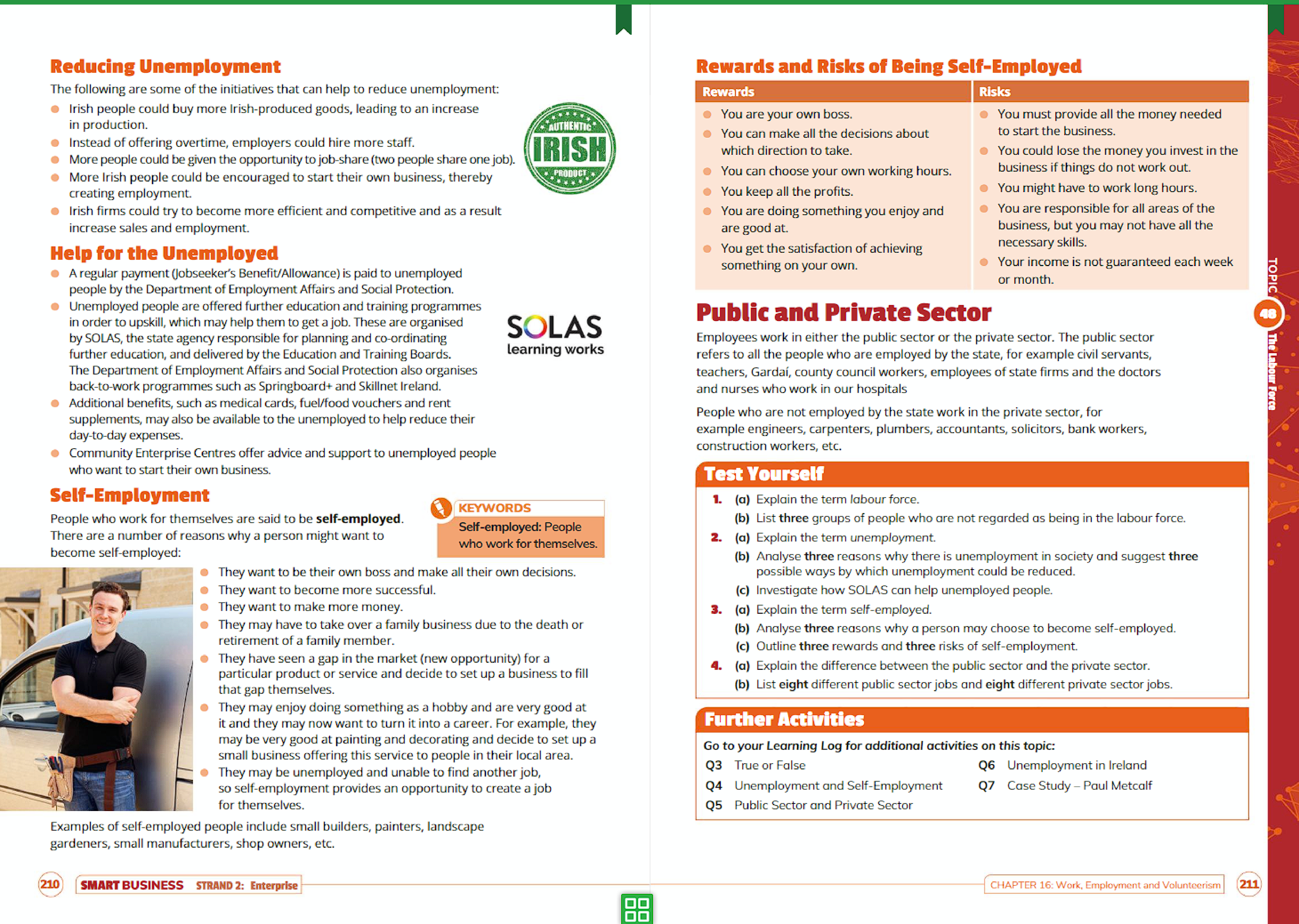
Reducing Unemployment
- Initiatives to Decrease Unemployment
Various initiatives aim to reduce unemployment in Ireland, such as:- Encouragement of Irish Production
Supporting local businesses can lead to more jobs and increased production. This could foster community support for local enterprises. - Job Sharing Opportunities
The concept of job-sharing can allow more individuals to partake in the workforce, effectively utilizing available positions without creating an increased burden on employers. - Encouragement for Entrepreneurship
Irish citizens are encouraged to start their own businesses, contributing to job creation. - Efficiency in Irish Firms
Firms are advised to enhance productivity which can lead to both increased employment and improved profits.
- Encouragement of Irish Production
Help for the Unemployed
- Benefits for Unemployed Individuals
The Department of Employment Affairs and Social Protection provides a regular payment (Jobseeker's Benefit/Allowance) for unemployed people, aiding them during their job search. - Training Programs
SOLAS organizes training and skill development programs to help unemployed individuals gain necessary skills for employment, emphasizing continuous learning. - Support from Community Centers
Community Enterprise Centres offer guidance on starting businesses, essential for those considering self-employment.
Self-Employment
- Definition of Self-Employment
Individuals who work for themselves are classified as self-employed. This mode of work offers various advantages and challenges. - Reasons for Choosing Self-Employment
Common motivations include:- Desire for autonomy and decision-making.
- Pursuing personal passions and hobbies.
- Financial independence from traditional employment.
Examples of Self-Employed Jobs
- These include roles such as builders, painters, landscape gardeners, and small manufacturers.
Rewards and Risks of Being Self-Employed
| Rewards | Risks |
|---|---|
| You are your own boss. | You must provide all the money needed to start the business. |
| You can make all decisions regarding the business. | You could lose the money you invest if things do not work out. |
| Flexibility in working hours. | You are responsible for all aspects of the business. |
| You keep all the profits. | Income is not guaranteed each week or month. |
| Opportunity to engage in enjoyable work. | The success of the business depends heavily on your management skills. |
Public and Private Sector
- Definitions
- Public Sector: Jobs created and managed by the government, involving civil service positions.
- Private Sector: Employment opportunities in privately-owned businesses.
Test Yourself Sections
- Understand and explain the term labour force.
- Identify groups who are not counted in the labour force.
- Discuss factors contributing to unemployment in society and ways it can be reduced.
- Explain the concept of self-employment.
- Distinguish between public and private sector jobs, and give examples.
Further Activities
- Activities aimed at reinforcing the information covered include true/false questions and case studies to apply knowledge practically.
These notes encapsulate key themes and initiatives related to unemployment and self-employment as discussed in the provided material.
Extended readings:
Types of Enterprise
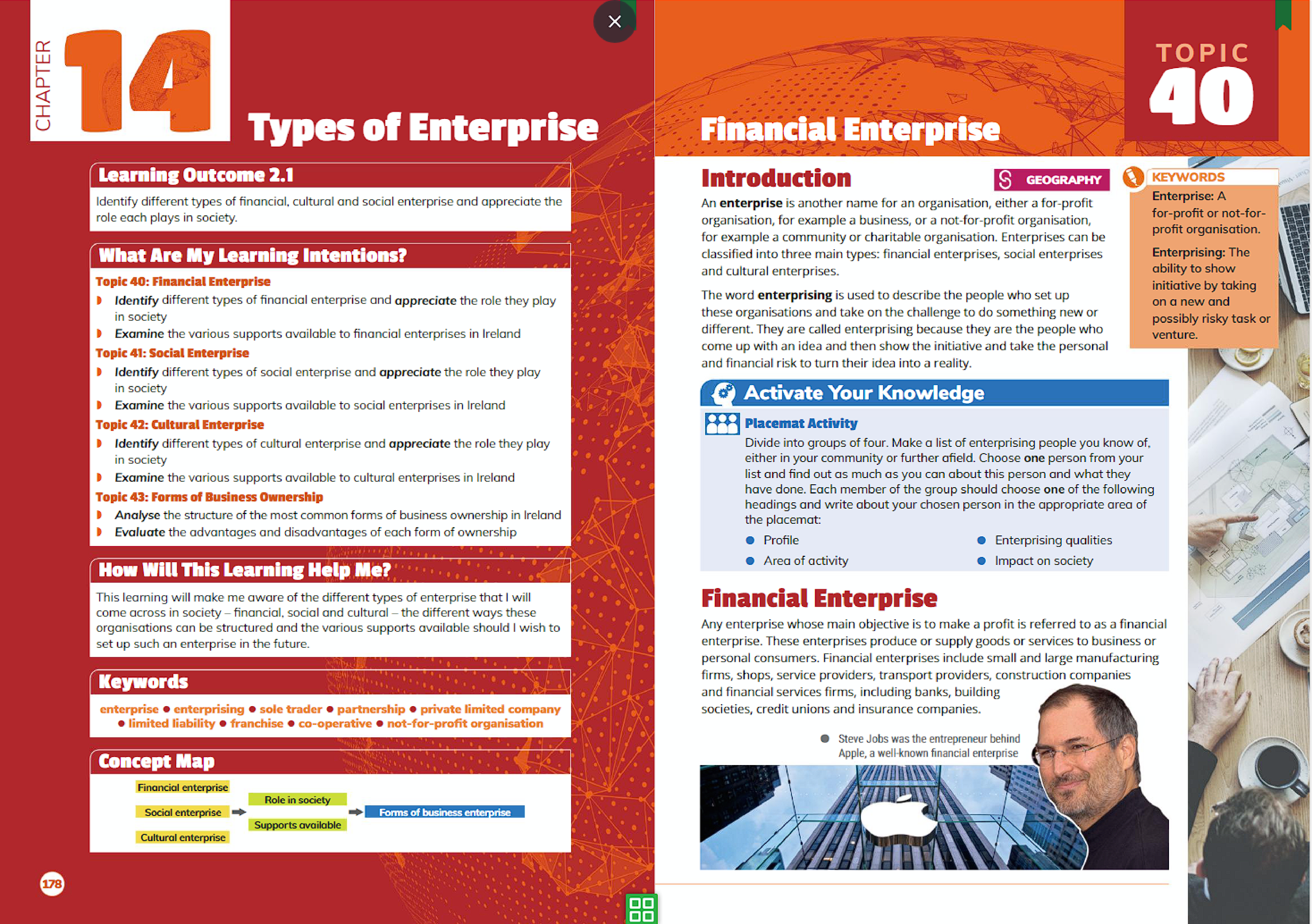
Learning Outcome 2.1
- Identify different types of financial, cultural, and social enterprise: Understanding these types helps in appreciating their roles within society.
- Examine various supports available: Each enterprise type has unique resources and support systems that aid in their functionality and success.
What Are My Learning Intentions?
Topic 40: Financial Enterprise
- Identify types of financial enterprises: These are entities like banks, insurance firms, and other institutions that aim to generate profit.
- Examine support available: Understanding available financial supports, like grants or loans, is crucial for their sustainability.
Topic 41: Social Enterprise
- Identify different types of social enterprises: These organizations prioritize social goals alongside profit-making, impacting community development positively.
- Examine support available: Resources that assist social enterprises can include social impact assessments and community grants.
Topic 42: Cultural Enterprise
- Identify types of cultural enterprises: Organizations in this category promote cultural initiatives, such as arts and heritage projects.
- Examine support available: Cultural enterprises might have access to funding from arts councils or cultural heritage grants.
Topic 43: Forms of Business Ownership
- Analyze business ownership structures: Common forms include sole traders, partnerships, and corporations, each with distinct advantages and limitations regarding liability and taxation.
- Evaluate advantages/disadvantages: Understanding these factors is essential for anyone considering starting a business.
How Will This Learning Help Me?
- Learning about diverse enterprise types prepares individuals for future engagements in various business or organizational roles, enhancing understanding of how to leverage support systems for success.
Keywords
| Keyword | Definition |
|---|---|
| enterprise | A business organization, either for-profit or not-for-profit. |
| enterprising | The ability to show initiative, often involving personal and financial risk. |
| sole trader | A business owned and operated by one individual. |
| partnership | A business owned by two or more individuals who share profits and liabilities. |
| private limited company | A company owned by shareholders with limited liability. |
| limited liability | A legal structure that protects personal assets from business debts. |
| franchise | A business model that allows individuals to operate under an established brand. |
| co-operative | A business owned and managed by a group of individuals for mutual benefit. |
| not-for-profit organization | An entity that operates without the goal of profit, focusing on social or community outcomes. |
Concept Map
- Financial Enterprise: Focused on generating profit, providing financial services.
- Social Enterprise: Aims to address social issues while being financially sustainable.
- Cultural Enterprise: Promotes cultural values and initiatives while striving for financial viability.
Financial Enterprise
- Definition: Any enterprise primarily focused on generating profit through providing goods or services to consumers and businesses.
- Examples: Include banks, insurance firms, larger retail establishments, and service providers.
- Importance: Financial enterprises play a critical role in the economy by enabling trade and facilitating financial transactions.
Placemat Activity
- Engage in group discussions about known enterprises to enhance understanding of their roles and impacts, focusing on:
- Profile: Overview of the enterprise.
- Area of Activity: Specific sector or market they operate in.
- Entrepreneurial Qualities: Characteristics that contribute to their success.
- Impact on Society: Contributions made to the community or society at large.
This structured note aims to provide clarity on the types of enterprises, enhancing comprehension for practical application in a variety of contexts.
Extended readings:
Notes on Skills and Characteristics of an Enterprising Person

Skills of an Enterprising Person
-
Planning
- Enterprising individuals must be proficient planners. They need to set short-term and long-term goals, subsequently devising a strategy to achieve those objectives.
- Thoughts: Good planning improves project outcomes and ensures efficient use of resources.
-
Decisive
- Being able to make firm decisions is crucial. Enterprising people should assess situations objectively, listen to diverse perspectives, and choose the best possible course of action.
- Ideas: Decisiveness can reduce indecision and promote a proactive approach to challenges.
-
Interpersonal Skills
- Strong communication and collaboration skills are essential for working effectively with others.
- Additional Info: Good interpersonal skills can enhance teamwork and foster a positive work environment.
-
Delegation
- The ability to delegate tasks is vital. An enterprising individual must delegate authority appropriately while maintaining overall control.
- Thoughts: Effective delegation empowers team members and encourages accountability.
-
Risk-taker
- Enterprising individuals must assess and take calculated risks, weighing potential success against possible failures.
- Ideas: Smart risk-taking can lead to innovation and growth within a business.
-
Multitasker
- The capacity to handle multiple tasks simultaneously is important in a fast-paced environment.
- Additional Info: Multitasking can improve productivity, but it requires effective time management skills.
Characteristics of an Enterprising Person
-
Confident
- A belief in their capabilities and potential for success fosters resilience and perseverance in the face of challenges.
-
Leadership
- Good leadership entails guiding others, inspiring teamwork, and being a role model in various ventures.
-
Flexible
- Adaptability to changing situations is crucial for enterprising individuals, enabling them to pivot as necessary.
-
Responsible
- Taking accountability for decisions and actions is essential; enterprising individuals face situations head-on, ensuring matters are resolved.
-
Hardworking
- An industrious nature, especially during early career stages, is essential to achieving business goals and self-development.
-
Innovative
- An inclination toward innovation involves seeking new methods and ideas, keeping businesses competitive and relevant.
Test Yourself Questions (Summary)
- Explain what is meant by an enterprising person.
- List and explain six skills of an enterprising person.
- Choose an enterprising person you admire and outline their achievements.
- Describe how various Irish governments have been enterprising in policy development.
Extended readings:
The Entrepreneur
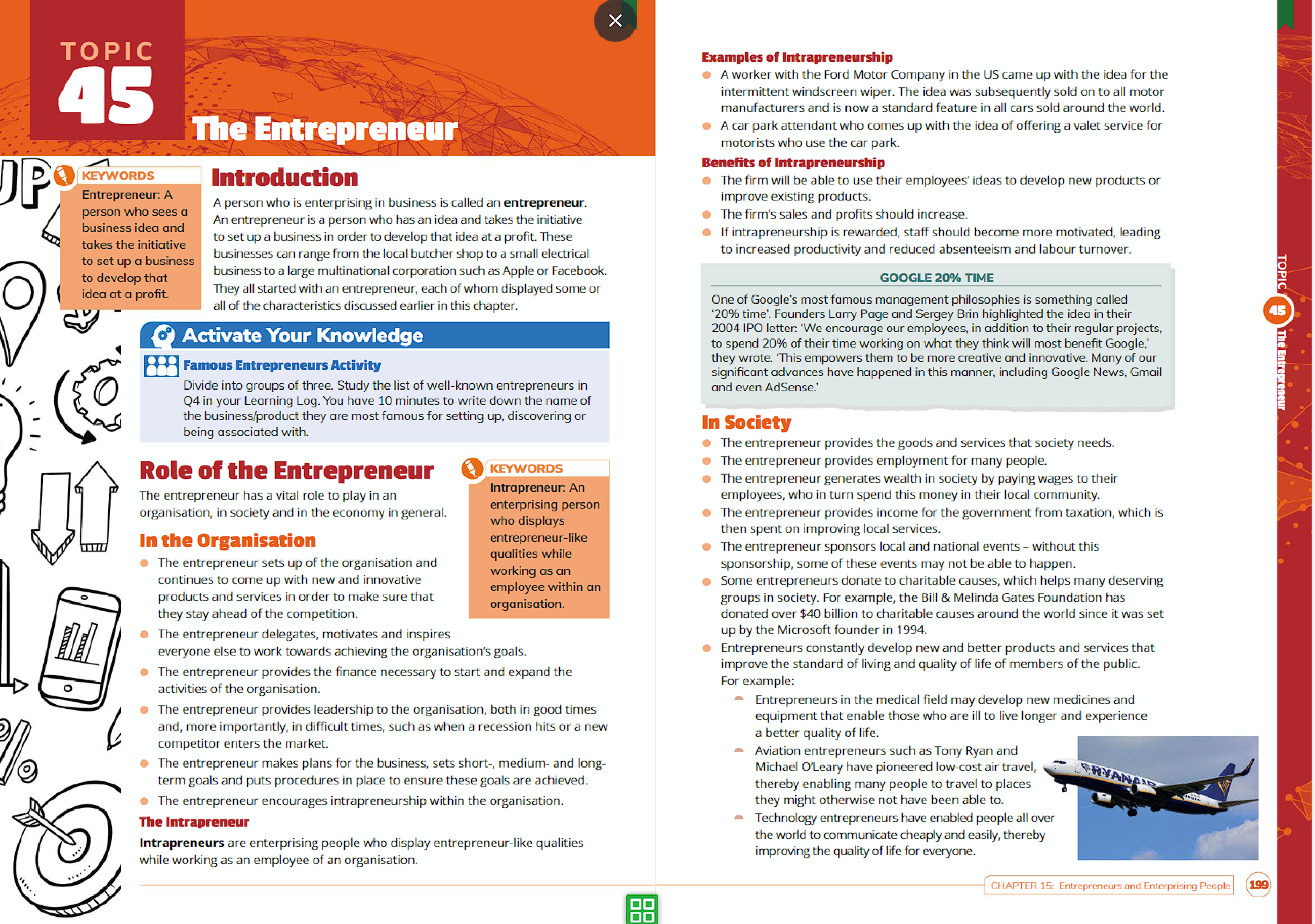
Introduction
- Definition of Entrepreneur: An entrepreneur is someone who identifies a business idea, takes initiative to start a business, and seeks to develop that idea into a profitable venture.
- Thoughts: Entrepreneurs are essential to innovation and economic growth, as they bring new ideas to the market.
- Additional Info: The concept of entrepreneurship has evolved, and today includes digital entrepreneurs who leverage technology to reach global markets.
Role of the Entrepreneur
- Vital Role: Entrepreneurs play a crucial role in the organization, society, and economy.
- Thoughts: They are often seen as risk-takers who drive change and create employment opportunities.
- Additional Info: Entrepreneurs can influence societal trends and economic development through their business initiatives.
In the Organisation
- Setting Up: Entrepreneurs set up organizations and innovate to provide products/services.
- Thoughts: Continuous innovation is vital to staying competitive.
- Delegation and Motivation: They motivate and inspire their teams to accomplish organizational goals.
- Thoughts: Leadership is key in creating a productive work environment.
- Providing Resources: Entrepreneurs ensure their organizations have the necessary resources to function.
- Thoughts: Financial management skills are crucial for sustainability.
- Leadership During Challenges: They lead during both good and bad times, helping the organization adapt.
- Thoughts: Resilience is important for navigating economic fluctuations.
The Intrapreneur
- Definition of Intrapreneur: Intrapreneurs are employees who act like entrepreneurs within an organization, displaying entrepreneurial qualities.
- Thoughts: Intrapreneurship encourages innovation without the risks associated with starting a new business.
- Additional Info: Companies that foster intrapreneurship often benefit from enhanced employee engagement and innovation.
Examples of Intrapreneurship
- Success Stories: Examples include employees who came up with groundbreaking ideas, like a new feature in a product or service that increased efficiency.
- Thoughts: Recognizing and rewarding intrapreneurial efforts can lead to significant advancements within a company.
Benefits of Intrapreneurship
- Employee Development: The firm can utilize employee ideas to improve products/services.
- Thoughts: This not only enhances productivity but also creates a culture of innovation.
- Financial Impact: Improved products/services can lead to increased profits.
- Thoughts: Successful intrapreneurship can result in competitive advantage and market leadership.
In Society
- Provision of Goods and Services: Entrepreneurs respond to societal needs by providing necessary goods and services.
- Thoughts: A strong entrepreneurial ecosystem can lead to overall societal progress.
- Employment Creation: They create jobs, thus supporting the economy.
- Thoughts: Employment growth feeds into other sectors, enhancing overall prosperity.
- Wealth Generation: By generating wealth, entrepreneurs stimulate local economies.
- Thoughts: Local businesses keep money circulating within communities, strengthening economic resilience.
Summary of Key Terms:
| Keyword | Definition |
|---|---|
| Entrepreneur | A person who takes initiative to start a business and develop ideas for profit. |
| Intrapreneur | An employee who exhibits entrepreneurial qualities within an organization. |
Additional Points
- Community Impact: Entrepreneurs sponsor local events and engage in charitable causes.
- Thoughts: This shows corporate social responsibility and fosters community trust.
- Diverse Contributions: Different types of entrepreneurs (e.g., social, technological) contribute distinctively to society.
- Thoughts: Understanding these various forms can help aspiring entrepreneurs find their niche.
Extended readings:
Work, Employment and Volunteerism
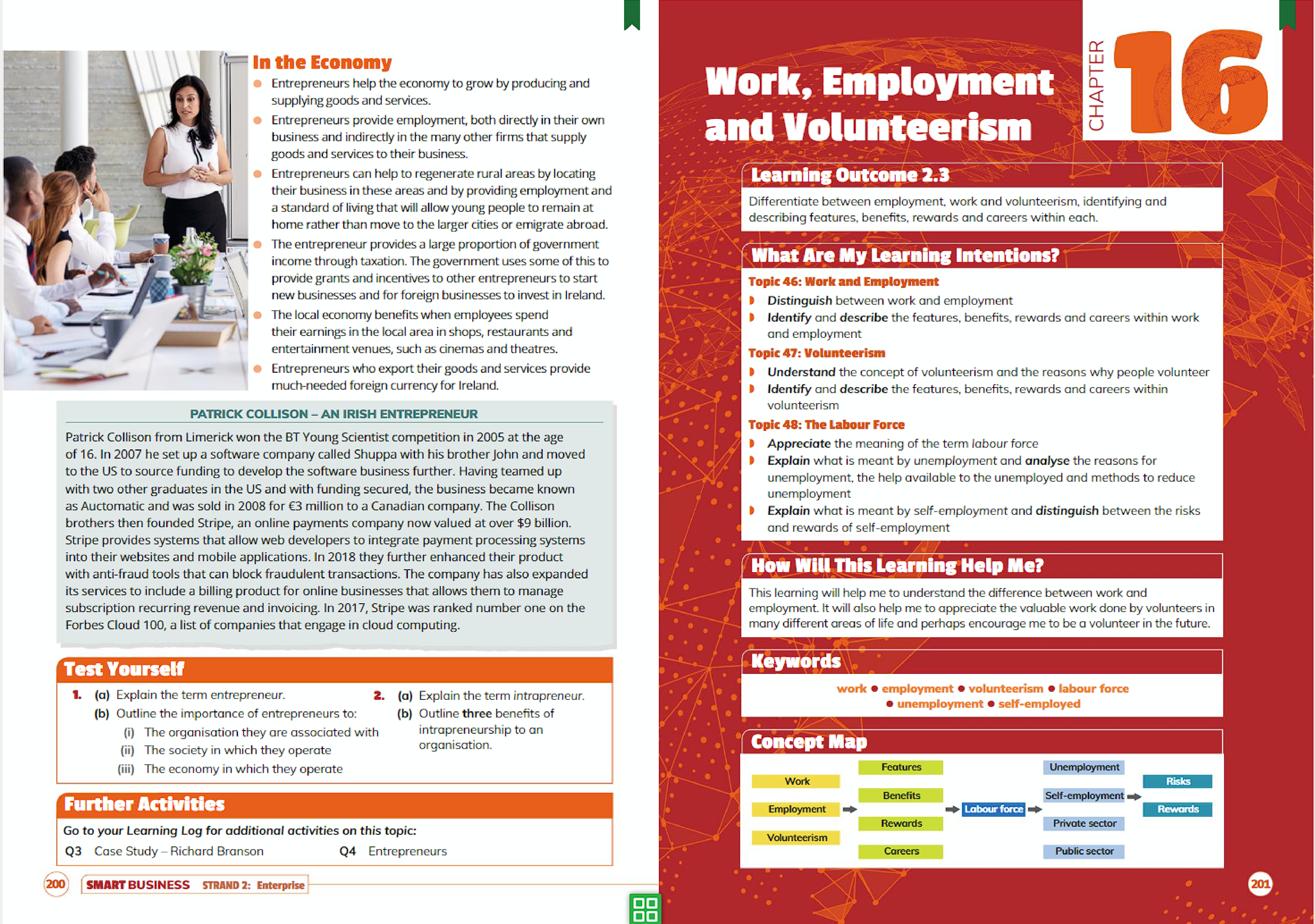
In the Economy
- Entrepreneurs play a crucial role in economic growth by supplying goods and services.
- They create direct and indirect employment, influencing local and national economies.
- Local Economic Benefits:
- Employment in local areas boosts economies through taxes and consumer spending.
- Entrepreneurs often reinvest in their communities, which can lead to infrastructure development and improved local services.
Patrick Collison - An Irish Entrepreneur
- Patrick Collison won the BT Young Scientist competition at age 16 and has made significant contributions to technology through his business endeavors.
- His story exemplifies how young entrepreneurs can influence the tech landscape.
- Founding Stripe, a company facilitating online payment processing, highlights the importance of solving real business problems.
Learning Intentions
Topic 46: Work and Employment
- Distinction Between Work and Employment:
- Work can encompass any productive activity, while employment is a formal arrangement with a specific compensation system.
- Features, Benefits, Rewards, and Careers in Work and Employment:
- Understanding these elements is crucial for navigating job markets.
Topic 47: Volunteerism
- Concept of Volunteerism:
- Volunteering not only helps communities but also provides personal growth opportunities.
- Reasons people volunteer can include altruism, skill development, and career advancement.
Topic 48: The Labour Force
- Definition of Labour Force:
- The labour force includes individuals who are employed and those actively seeking employment.
- Unemployment Causes:
- Structural, cyclical, and seasonal factors contribute to unemployment.
- Understanding these causes helps in addressing economic challenges.
How Will This Learning Help Me?
- The knowledge will clarify differences between employment and volunteer opportunities.
- Recognizing value in volunteering can inspire community service and engagement.
Keywords
- Work, Employment, Volunteerism, Labour Force, Unemployment, Self-employed
Concept Map
| Category | Features | Benefits | Rewards | Careers |
|---|---|---|---|---|
| Work | Different types of work | Flexibility, networking | Personal satisfaction | Varied paths |
| Employment | Formal agreements | Job security, benefits | Financial stability | Career advancement |
| Volunteerism | No monetary compensation | Skill development, networking | Social impact | Community service roles |
Test Yourself
- Define the term entrepreneur.
- Think about how entrepreneurs innovate and take risks to create businesses.
- Explain the term intrapreneur.
- Intrapreneurs drive innovation within organizations, often using company resources to launch new ideas.
- Benefits of intrapreneurship include fostering a culture of creativity and retaining talent.
Further Activities
- Explore case studies of notable entrepreneurs.
- Reflect on personal volunteering experiences and their impacts.
Extended readings:
Work and Employment

Introduction
- Definition of Work: Work refers to any activity requiring effort, like completing homework or cleaning up a space.
- Definition of Employment: Work performed for payment, distinguishing it from activities that do not involve financial remuneration.
Features of Work and Employment
| Features of Work | Features of Employment |
|---|---|
| No payment is received for work. | You receive payment for employment. |
| No legal rights or responsibilities. | You have legal rights. |
| No formal contract exists. | You must be given a written contract of employment. |
| No specific rules or procedures. | Clearly defined duties with expected targets. |
| No time set for task completion. | Employment comes with legal, moral, and ethical responsibilities. |
Thoughts:
- Distinction: Understanding the difference between work and employment is crucial in recognizing various types of participation in economic activities. Employment involves legal structures and protections that regular work does not.
Benefits of Work and Employment
| Benefits of Work | Benefits of Employment |
|---|---|
| Allows contributions to the community. | Provides an income for people. |
| Enables skill development. | Offers job security for families. |
| Enhances community reputation. | Facilitates learning of new skills. |
| Fosters family connections. | Increases self-esteem through belonging. |
| Grants access to holidays and sick leave. | |
| Builds new social connections. |
Thoughts:
- Contribution: Work that focuses on community improvement reflects social responsibility that can enhance personal fulfillment. Employment benefits, such as income and stability, highlight its importance for financial security.
Rewards of Work and Employment
| Rewards of Work | Rewards of Employment |
|---|---|
| Personal satisfaction from tasks. | Financial rewards (e.g., salary, bonuses). |
| Praise and gratitude from others. | Benefits like company car or recognition. |
| Promotions and personal growth opportunities. | |
| Profit-sharing schemes provided by firms. |
Thoughts:
- Incentives: Rewards from both work and employment significantly impact motivation and job satisfaction. Non-monetary rewards can be as important as financial ones, playing a role in long-term engagement and loyalty.
Example of Work or Employment Activity
- Firefighter putting out a house fire: Employment (receives pay).
- Gardener on duty: Employment (receives pay).
- Tony McManus painting his house: Work (no payment involved).
- ABC Painters painting Ms Cahill's house: Employment (receives pay).
- Susan Gahan planning a marketing campaign with Acmes Associates: Employment (receives pay).
- Sylvia Meyler minding her children at home: Work (no payment involved).
- Jean Halpin servicing her car at home: Work (no payment involved).
Thoughts:
- Classification: Some activities, despite requiring effort, may not be classified as employment if they do not involve payment. Recognizing these distinctions is important in evaluating contributions to society and economy.
This information provides a structured understanding of work and employment, emphasizing key characteristics, benefits, and rewards associated with each.
Extended readings: